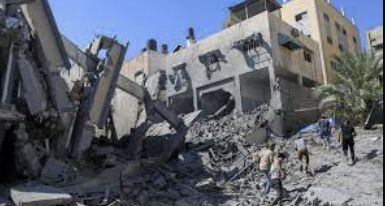Israel-Hamas Conflict Intensifies Amid Regional Tensions: Threat of Wider West Asia War Looms
The ongoing Israel-Hamas conflict continues to escalate, sparking concerns of a broader regional war. Israeli airstrikes in Gaza have resulted in numerous casualties, while clashes at the Lebanon border intensify. The United States warns of significant risks to its interests in the region.
The ongoing conflict between Israel and Hamas shows no sign of abating as both sides continue to escalate their military actions. The situation has sparked concerns that the conflict could spread across West Asia, leading to a wider regional war. The United States has also issued a warning about the significant risk to its interests in the region. In the past 24 hours, Israeli air strikes in Gaza have resulted in the deaths of 266 Palestinians, including 117 children, according to Gaza's health ministry. Israel has imposed a total siege on the enclave since the deadly infiltration by Hamas gunmen on October 7.
The situation has further deteriorated with Israeli missiles hitting Damascus and Aleppo airports in neighboring Syria, resulting in the airports being put out of service and the deaths of two workers. At Israel's northern border with Lebanon, clashes between Hezbollah and Israeli forces have intensified. Hezbollah, backed by Iran, has been supporting Hamas in this conflict. The clashes mark the deadliest escalation of violence since the Israel-Hezbollah war in 2006. Four Hezbollah fighters were killed in heavy exchanges of fire on Sunday, adding to the 24 members killed since October 7.
On the Israeli side of the border, at least five soldiers and one civilian have been killed. Israeli Prime Minister Benjamin Netanyahu warned Hezbollah against launching a war, stating that it would be a grave mistake. As violence persists along heavily guarded borders, Israel has expanded its evacuation contingency plan in the north by including 14 additional communities close to Lebanon. Within Gaza, Palestinians have reported receiving military warnings from Israel to move from the north to the south of the territory to avoid the deadliest areas of the conflict.
Israeli military leaflets dropped in the region contain an added warning that those who remain in the north may be identified as sympathizers with a terrorist organization. The Gaza health ministry has noted that most of the casualties from recent air strikes have been in the south of Gaza. Israel's military has stated that its strikes primarily target Hamas members and installations, denying any intentional targeting of civilians.
However, the increased airstrikes across Gaza are aimed at reducing risks to Israeli troops in preparation for the next phase of the conflict, which many believe will involve a ground invasion. Tensions continue to rise in the region, with fears that the Israel-Hamas conflict could spread and further escalate into a wider West Asia conflict. The United States has expressed concerns about the risk posed to its interests in the region and has warned Iran-backed groups of a decisive response should they attack American forces.




